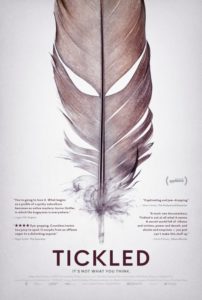Tickled is a very smart documentary investigating our collective failures at the macro level. The legal system, the school system and our community ecosystem have “leakages.” Our failure has been forgetting we are linked and responsible for each other’s well-being, as the Dalai Lama and other spiritual leaders teach. We haven’t tried hard enough nor succeeded enough, and we know this because individuals responsible for causing damage continue to hoodwink and exploit others and perpetuate cycles of violence. In other words, Tickled, debuting at Sundance this 
The narrative is conveyed with Charlie Brown likability by Farrier and Reeve; Farrier is a journalist attracted to zaniness who one day discovers the sport of Competitive Endurance Tickling online. In the game, someone is tied up at their hands and feet and tickled by one person or several. With its cuffs and participant comments about losing control and “you might as well enjoy it,” the game links in elements of desire, fetishism, sadism, and masochism. At one point the games were rumored to be a test for the military to see if tickling would hold up as a torture tactic. The person whom the filmmakers identify as running the organization – an apt word as there are tickle huts worldwide where the sessions are filmed and staff, including casting agents, who organize at the local level for the games – is now suing the filmmakers for defamation.
The most successful of documentaries are made by director-artisans who use good technique to bring real life to film life and engage a broad audience. I noticed the directors thank their Kickstarter supporters, which run up a significant list. When they move filming to America, Farrier mentions he has a tourist visa, and I remained impressed with his dedication to his work and also, his courage. Farrier’s discovery of the competitive tickling world turned into this documentary when he queried about the games and received a hostile, homophobic response from the producers. His pursuit of information led quickly to legal charges against him and he and Reeve decided to make the film. (Yes, they have been in trouble with the law since they began pursuing this story.) Their commitment to expose unclear authority and the secrets of its network is similar to what Louie Psihoyos and his team did in The Cove. It is a brilliant attitude of art-making, admirable for its bravery, and what Farrier and Reeve uncover is the film we see.
Dina Paulson-McEwen
Latest posts by Dina Paulson-McEwen (see all)
- Interview with Hannes Holm, writer/director of A Man Called Ove - April 15, 2017
- Unknown Pleasures and Paul Thomas Anderson’s Junun in Berlin - July 3, 2016
- 10 Best Things About the 2016 Oscars - March 1, 2016